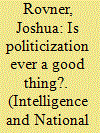| Srl | Item |
| 1 |
ID:
118368


|
|
|
|
|
| Publication |
2013.
|
| Summary/Abstract |
Politicization is the manipulation of intelligence estimates to reflect policy preferences. Policymakers are guilty of politicization if they compel intelligence agencies to alter their conclusions in ways that are politically convenient or psychologically comforting. Intelligence officials are guilty of politicization if they shape their estimates to reflect their own beliefs and preferences. At first glance politicization appears to be an unalloyed hazard: manipulating estimates seems to make bad intelligence inevitable. Nonetheless, some observers argue that under certain circumstances politicization can be a good thing, or at least a necessary risk. Intelligence officials should be willing to take that risk if the alternative means isolating themselves from the policy process and sacrificing any possible influence over policymakers' judgment. They also should be willing to tone down their conclusions on major issues, or withhold estimates on minor ones, in order to avoid offending policymakers. This kind of 'soft politicization' does not mean outright pandering, but it does constrain intelligence leaders from being blunt about estimates that are frankly at odds with policy beliefs and preferences. This article evaluates the possible benefits of politicization and tests it against the historical record. I conclude that politicization - even soft politicization - undermines the quality of threat assessment and does lasting damage to intelligence-policy relations.
|
|
|
|
|
|
|
|
|
|
|
|
|
|
|
|
| 2 |
ID:
118369


|
|
|
|
|
| Publication |
2013.
|
| Summary/Abstract |
After surprise attacks and other intelligence failures, the complaint is often heard that if only decision-makers had listened more closely to the warnings they had received, disaster might have been avoided. But even though it is generally agreed that intelligence is of little use unless it is received and understood by policymakers, we actually know little about why some leaders are receptive toward intelligence, while others are not. This article argues that the willingness of decision-makers to listen to intelligence depends primarily on two factors: their belief in the seriousness of the issue or threat involved, and their trust in the utility of intelligence. It examines contrasting receptivity toward intelligence in the cases of Pearl Harbor and the Battle of Midway, and suggests that our current models of intelligence-policy relations need to be revised.
|
|
|
|
|
|
|
|
|
|
|
|
|
|
|
|